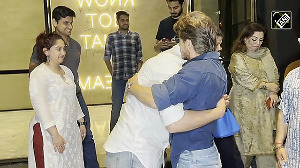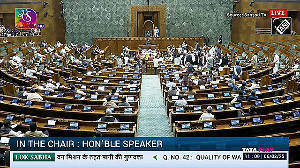

Like most young men, they dreamt of a comfortable life. And they thought their dreams would be fulfilled abroad.
For eight Indian Tamilians, however, this story had a different ending. On April 25, 2003, they were arrested on drug trafficking charges in Malaysia. On January 7, a little over nine months later, they were released. Three days later, they returned to Chennai with broken dreams and mounting debts.
This is the story of two of these young men -- Thiruselvam and Selvam.
Thiruselvam, 24, comes from a small village, Kodikullam, in Tamil Nadu's Ramanathapuram district. President A P J Abdul Kalam belongs to this district as well.
He dropped out of school in the tenth standard. A few years of working in his field, and in the fields of others for daily wages, left him frustrated. Some people from his village were working in Malaysia, so he decided to go there as well. He approached an agent, Ganesan, who provided him with a tourist visa and an air ticket in exchange for Rs 40,000. He advised him to get a work permit in Mayalsia. On January 25, 2003, Thiruselvam boarded a plane in Chennai for Kuala Lumpur.
A Malaysian called Moorty, who originally hailed from Elayamkudi, 30 kilometres from Kodikullam, helped Thiruselvam find accommodation in Kuala Lumpur. The rent was 100 Malaysian ringgits (approximately Rs 1,200) per month for a room he would share with three other Indian Tamilians. Four more Indian Tamilians stayed in the next room. Two Malaysian Tamilians -- John alias Shanmugam and Mann alias Rajkumaran -- lived in the ground floor. Since Thiruselvam paid them rent, he assumed they were the owners; it was only much later that he learnt they had rented the premises.
Thiruselvam got himself a working visa and became a labourer in a construction company. On weekdays, he worked from 8 am to 9 pm with an hour's break for lunch. On Sundays, he worked from 8 am to 5 pm. He earned 600 ringgits per month, of which he sent 400 ringgits home.
On April 25, mid-way through dinner, he and the remaining nine Tamilians was arrested at gunpoint by the Malaysian police, who seized packets of heroin from the ground floor. They were taken to court and remanded for 12 days. The police, who said they had found 65 packets of heroin, questioned them in Malay, a language known only to Malaysian Tamilians. The eight Indians had no clue as to what was happening but if their involvement in drug trafficking was proved, they would be hanged.
In jail, they realised John was a dubious character. At their next appearance in court, an interpreter who spoke Tamil was present; the judge told them they would be allowed to speak later. Yet, even during the next two sessions, they were not allowed to speak. In the third month after their arrest, they wrote a letter in Tamil explaining what had happened and gave it to the judge. He refused to accept it and asked them to get a lawyer.
 An advocate called Radhakrishnan was present at the next hearing. He had read about them in the newspapers and promised he would free them in two months. He gave them airmail letters and they wrote to MDMK leader Vaiko and Tamil Nadu Chief Minister J Jayalalithaa. Their plight was reported in Indian newspapers. The central and state governments pushed for their release. The Peace Trust, an NGO based in Dindigul, took up their case.
An advocate called Radhakrishnan was present at the next hearing. He had read about them in the newspapers and promised he would free them in two months. He gave them airmail letters and they wrote to MDMK leader Vaiko and Tamil Nadu Chief Minister J Jayalalithaa. Their plight was reported in Indian newspapers. The central and state governments pushed for their release. The Peace Trust, an NGO based in Dindigul, took up their case.
Karupiah Devar, a village elder, said they discovered the plight of these young men when a villager who had gone to Ramanathapuram saw the newspapers there and read Vaiko's statement.
Thiruselvam's mother Palavandammal became hysterical and rolled on the road, screaming with fear and grief, when she heard of his arrest. All the villagers went to the collector for help; he asked them to return on another day. A small group was selected to make a second visit to the collector, who advised them to approach the court in Paramakudi. In court, the villagers told the judge the young men were barely educated and were innocent. The local police certified they had no criminal background and no cases were registered against them here.
The Indian high commissioner in Malaysia met the eight Indians six months after their arrest. Immediately after his visit, the jail authorities gave them permission to write home. Later, an Indian journalist published Thiruselvam's letter.
Though their next hearing was scheduled for January 19, they were taken to court on January 7 and, much to their surprise, released. The police handed them over to the immigration authorities as their visas had expired while they were in jail. Local Tamilian workers and relatives pooled in to buy their air tickets home.
Thiruselvam shudders as he recalls the Kuala Lumpur jail, where 12 prisoners were crowded into each cell. Every time they returned from court, they were strip-searched. Sometimes, the guards made him do 50 sit-ups while naked. On one occasion, he was slapped four times for taking hot water without permission.
Breakfast, at 7 am, was five biscuits and water. All 900 prisoners were then crowded into the small prison compound where they had barely enough place to stand. Lunch, which was served at 11.30 am, was eaten in the cell. It consisted of a little worm-ridden rice (mixed with paddy), a curry and a vegetable. Thiruselvam would clean the rice of the worms before eating it. At 5 pm, they were let outside for roll call. They then collected their dinner and were locked up in their cell.
Water came at 11 pm and inmates had to use the open toilet in each cell. They had just one set of clothes. Every day, they would bathe, wash the clothes they were wearing and wait for them to dry before they wore them again. Soap and oil were unavailable luxuries. Their hair was cut short and they were shaved once a month.
After they were released, their clothes were not returned. Neither were the 25 ringgits that were in Thiruselvam's pocket when he was arrested. They never went back to their rooms. They returned home in clothes borrowed from other labourers. Thiruselvam still has his prison clothes. He had gone to make a fortune. He was lucky to return with his life.
He believes they should be compensated because they were wrongly arrested and jailed. He feels the Indian government should take the Malaysian government to task.
Selvam, a fifth standard dropout, decided to try his luck abroad because his income as a farmer was not enough. He is 28, married and has two children -- a three-year-old son and a one-year-old daughter.
Selvam approached an agent in Paramakudi. He paid him Rs 85,000 for the air ticket and a work permit. He reached Malaysia on November 25 and stayed with relatives for a fortnight. Then he shifted to the same paying guest accommodation as Thiruselvam. Selvam worked for the Lightan Construction Company as a cleaner and was paid 800 ringgits per month of which he sent home 500 ringgits.
On that fateful night, he was having a bath when he heard a loud sound. Frightened, he ran out of the bathroom. A policeman pointed a gun at him and made him sit down. He saw the two Malaysian Tamilians being dragged out of their room. The police found some packets in their room. There were two bathrooms on the ground floor. The Indian Tamilians used one. In the second bathroom, which was used by the Malaysian Tamilians, the police found some more packets.
The cops arrested and handcuffed everyone. They were taken to court where they were fingerprinted and remanded to police custody. The next time they went to court, there was an interpreter who spoke Tamil. Selvam told him about his family and his job at the Lightan Construction Company. The interpreter assured him that since the drugs were found on the ground floor and they lived on the first floor, they would be released soon.
In prison, Selvam pleaded with John who actually dealt with the drugs, 'We were only your tenants. Why don't you tell them that and get us released?' John refused.
He cannot forget the cell or the open air toilet in which excreta floated all the time. They had to eat sitting next to it. He remembers removing worms from the rice. There was no salt in the food and no sugar in the tea. He fell ill twice but was never given medicine. He began to believe he would die in prison. He knew he would hang if he was convicted.
He was never beaten in jail but recalls the humiliation every time they returned from court. He was stripped and asked to touch his toes so that the prison guards could check his anus for contraband.
Selvam lost all his belongings and the 500 ringgits that were in his room. He also lost the 300 ringgits that were in his pocket when he was arrested. He had borrowed Rs 80,000 rupees to go to Malaysia; with interest, his loan is now Rs 150,000. He does not know how he is going to clear it.
Photograph: A Ganesh Nadar
Image: Lynette Menezes






 © 2025
© 2025